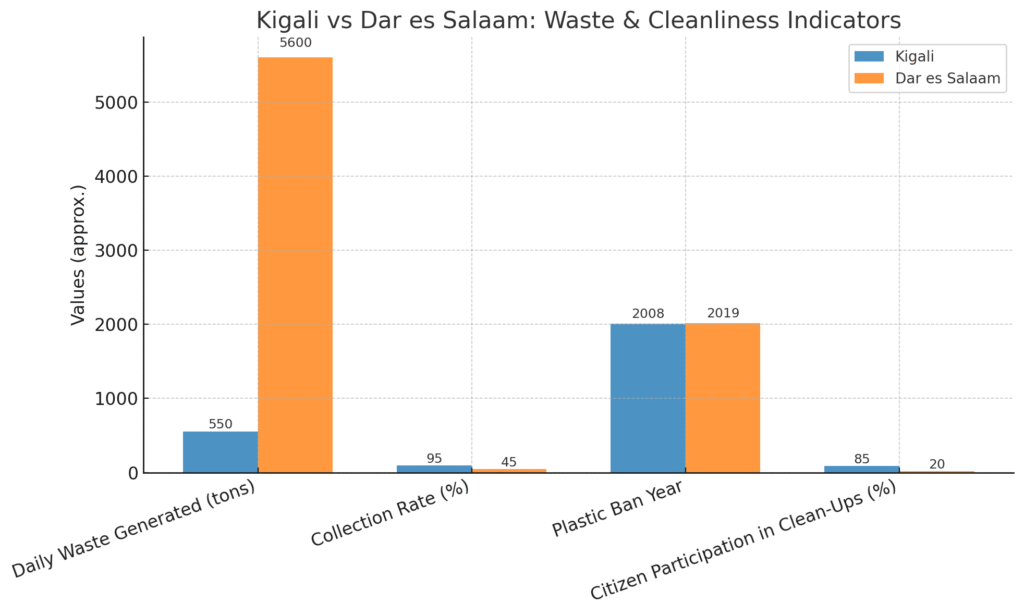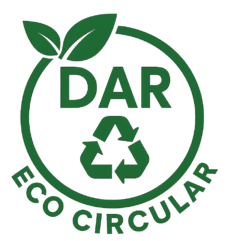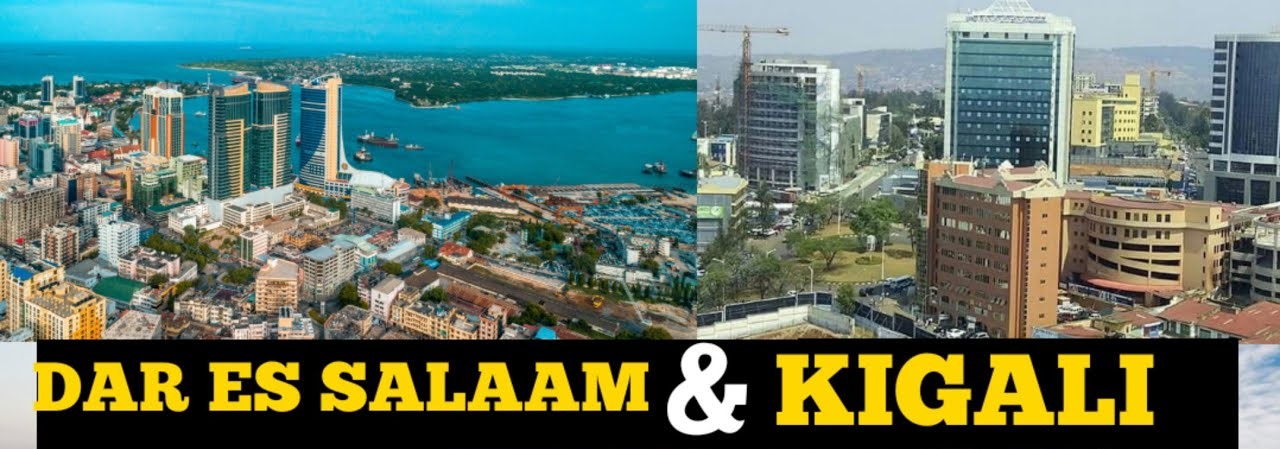🌍 How Dar es Salaam Can Learn from Kigali: From Pugu Landfill to a Circular City
Kigali’s success → Dar’s challenges → Dar Eco Circular’s actions → global policy lessons → call to action.
When you hear of the cleanest city in Africa, Kigali, Rwanda almost always comes first. Its streets are free of litter, citizens actively participate in clean-ups, and strict waste management laws have made it a global model for urban cleanliness.
But what if Dar es Salaam—a city of over 7 million people and Tanzania’s economic engine—could learn from Kigali and even go further? At Dar Eco Circular, we believe this is not only possible—it is urgent. By adapting Kigali’s lessons to Dar’s unique scale and challenges, the city can become cleaner, healthier, and more resilient, while leading Africa in circular economy solutions.
📊 The Data: Kigali vs. Dar es Salaam
-
Waste Generated Daily: Kigali ~550 tonnes vs. Dar es Salaam ~5,600 tonnes
-
Collection Rates: Kigali ~95% vs. Dar ~40–45%
-
Plastic Ban: Kigali (2008, strictly enforced) vs. Dar (2019, weak enforcement)
-
Citizen Clean-Up Participation: Kigali ~85% (Umuganda) vs. Dar <20%

This comparison reveals both the gap and the opportunity. Kigali’s scale is smaller, but its systems and culture can inspire Dar es Salaam’s transition.
✨ Lessons Dar es Salaam Can Adapt
1. Community Clean-Up & Collective Responsibility
-
Kigali: Umuganda mobilizes 80–90% of households monthly.
-
Dar’s Opportunity: Drawing on Tanzania’s Ujamaa spirit, Dar Eco Circular is launching a Monthly City Clean-Up Day—engaging schools, businesses, mosques, churches, and households.
👉 Target: Reach 50% household participation within 3 years.
2. Public Awareness & Education
-
Kigali: Campaigns link cleanliness to dignity, health, and tourism.
-
Dar’s Need: 60% of residents lack clear knowledge on waste segregation. Dar Eco Circular is rolling out school eco-clubs, social media campaigns, and neighborhood training to shift culture from waste disposal to waste value.
3. Enforcement & Penalties
-
Kigali: Littering attracts strict fines, coupled with community pride.
-
Dar’s Gap: Weak enforcement undermines existing laws. We advocate for PPP-led enforcement, combining tech reporting apps, waste cooperatives, and city oversight to monitor and fine violators fairly.
4. Efficient Waste Management Systems
-
Kigali: High collection efficiency with strong private operator partnerships.
-
Dar’s Challenge: Only four official dumpsites; trucks often can’t keep up. Dar Eco Circular proposes localized waste hubs for recycling, composting, and waste-to-energy (WtE)—cutting pressure on landfills like Pugu.
5. Partnerships & Innovation
-
Kigali: PPPs manage collection and recycling effectively.
-
Dar’s Potential: We are developing biodegradable bags from organic waste, integrating waste pickers into formal cooperatives, and enabling mobile money payments for waste fees (M-Pesa, Tigo Pesa, Airtel Money) for efficiency and transparency.
🚀 From Pugu Landfill to Circular Solutions
The biggest test for Dar es Salaam is closing Pugu Kinyamwezi landfill. Landfills are unsustainable: they release methane, pollute groundwater, and waste valuable land.
Globally, cities moved away from landfills through policy reform. For example, England raised landfill taxes, making dumping more expensive than recycling or building WtE plants. Within a decade, recycling and WtE became the norm.
For Dar, the pathway is clear:
-
Policy: Increase landfill disposal fees and incentivize recycling/WtE investments.
-
Infrastructure: Build recycling plants, composting hubs, and a flagship WtE facility.
-
Inclusion: Empower SMEs and waste pickers as part of a green jobs ecosystem.
The vision is for Dar es Salaam to transition into a network of recycling and WtE plants, anchored by the Dar Eco Circular – Pemba Mnazi Eco-Industrial Park, turning waste into energy, fertilizer, and raw materials.
🌍 Why This Matters
By learning from Kigali and adapting global best practices, Dar es Salaam can:
✅ Cut landfill dependency and reduce greenhouse gas emissions
✅ Create thousands of jobs in recycling, composting, and clean energy
✅ Boost competitiveness with cheaper shared utilities and circular industries
✅ Protect public health through cleaner neighborhoods and safer waste handling
✅ Build pride and participation, where every citizen sees waste as a resource
🤝 Join the Movement
A cleaner Dar starts with all of us.
🌍 Individuals: Volunteer for our Monthly City Clean-Ups.
🏢 Corporates: Integrate waste management into CSR and co-fund recycling hubs.
🤲 Development Partners: Invest in scalable circular economy solutions across Tanzania.
🏛 Government & Regulators: Support policy reform and enable SEZ incentives for WtE and recycling.
👉 With Dar Eco Circular’s leadership and your participation, Dar es Salaam can stand proudly alongside Kigali—and even set a new standard for Africa’s clean and circular cities.
✨ Kigali has shown us the standard. Dar Eco Circular is showing us the path forward.



Leave a Reply